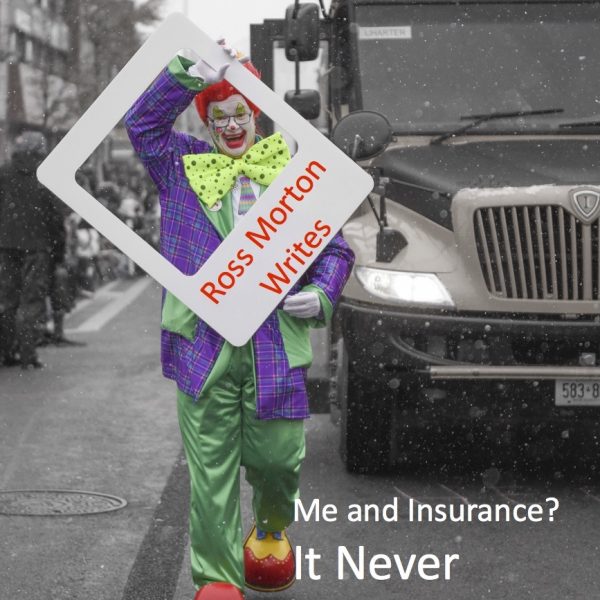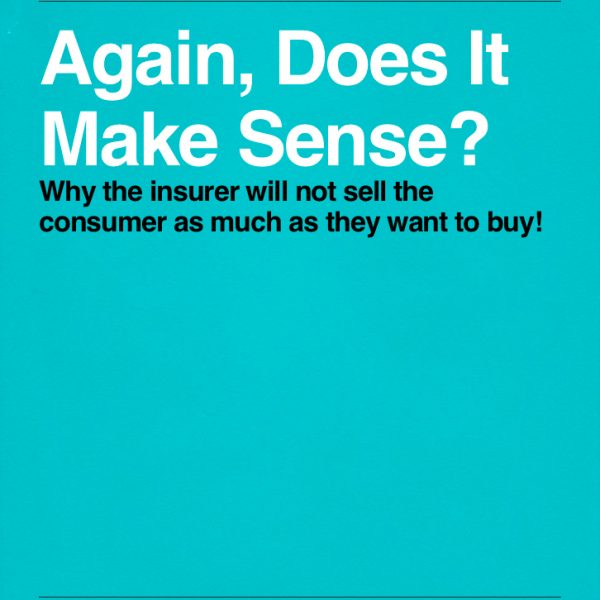There continues to be times in my life that I snuggle down and feel secure that I have seen it all and nothing startling can happen. But, just like the time I sat down on a red-hot cooking iron hiding on the fringe of a warm campfire, I am jolted to reality and put into hyperactive mode. No my travels have not put me (or rather my dernier) in contact with a hot poker. However, I have just been presented with the results of a small survey of facultative underwriting as practiced today in my favorite market for insurance, Canada.
We are all too aware that everything is measured today; be it your legs for a suit or the number of life insurance applications that fall into measurable categories. For a reinsurer the measurables are time service and decisions — how many standards, how many +50%, how many +100%, etc. through to declines. The latter were always in the minority. There was a time when a reinsurer would concur with the prowess in a direct company and agree that the particular impairment or combination of impairments was such that decline sufficed. Did that happen often? No. The reinsurers declined about 20 to 30% of what was sent facultatively to life reinsurers. There was as always free enterprise at work and great disagreement abounded over which cases were indeed decline, thus keeping the incidence rate for all declining to low 20% level.
With “hot” competition that number was perceived to be lower today; but, given that risk selection still meant discarding the really poor cases, it should not have changed more than 5%. There was something comforting in believing that reinsurers still were predictably declining to accept those applications for insurance where the proposal’s health history, occupation, avocation, aviation or combination of all. After all, the laws of antiselection, deteriorating health and the shear cost of mortality were, I thought naively, still barriers to accepting certain risks.
Did mistakes ever happen? That is like asking if my stomach or more southerly regions of my digestive pit have ever known the ravages of food poisoning or overly spiced dishes in some exotic land (Bombay to Richmond Hill). Blunders happen. In a rush to get a decision out to a customer (the insurer) mistakes happen in transcribing the quote at the reinsurer’s communication centre (fancy monogram for fax or telephone). Wrong message attached to wrong file. Missing page in a reinsurance file having disappeared on the photocopier or fax machine. Young Turk (not sure if this is a politically correct term today?) underwriter who does not hear the medical consultant’s opinion or did not ask the right question has put the reinsurer in jeopardy many a time. Any or all have happened on cases and the reinsurance underwriter goes from Turk to turkey in a matter of minutes.
Now to the true-life adventure or at least a paltry few words of comments on today. A noteworthy Canadian insurance company’s underwriting department, in its zeal (zeal is good) to get the best for its brokers, shops the file. This is when a ceding company, the insurer, decides that it may not want the case or feels the assuming company (reinsurers) might like it better the file to 2 or more reinsurers. The reinsurer first back with the lowest price wins in most cases. There are some companies with complex reinsurance rules as to who wins what, when and how. Knowing the readership, I will stick to the simple explanation that the first low price quote for the case is awarded the honour of providing risk coverage for the ceding company. More succinctly put, the first in with cheapest price wins!
Since reinsurers see so many non-standard cases, their expertise can often save the day and find a price for most cases it sees. Experience has varied from reinsurer to reinsurer. The odd reinsurer (please peers do not take that as a direct criticism) may win cases in greater numbers than its competitors. The other competitors complain, throw mud and stomp their feet. The next month or quarter, the stomper becomes the stompee and the stompee becomes the stomper. In 28 years I have witnessed and sought help every time the tables turn and the oppressed become the oppressors. Stompers can be oppressors as can they be oppressed and stompees can be oppressed or oppressor?
The fine company in question or more correctly its service oriented underwriting management, followed 19 cases that it wanted no part off since by all normal underwriting rules of protocol and risk selection these cases were “really, really bad”. Immediate death claims all. Straight to the mortality heap for these 19 unquotable cases. The brokers who found these lives (just) should be ostracized for at least an hour. The first step in the travels of these 19 cases was to the copier or fax, where, with the push of a couple of buttons, reproductions of the file ended up in five reinsurance abodes.
With a craving like you could never imagine, diligent and well-trained reinsurance underwriters attack the files. Given that cases reinsurers see are all bad or tough the reinsurance underwriter is charged with finding the good and thus putting a price (winning) on the file. With the latest in medical know how beating on the computer screens as the medical networks get searched, the underwriter is frantically trying to find ways to quote as low as possible for that marginal edge over “reinsurer x”. I have never met “reinsurer x” and have often wondered, aloud at times, if I will ever meet anyone who has worked in “reinsurer x”.
Constantly nagging in the left ear is the conscience saying go lower and faster. In the right is the corporate actuary saying, “don’t do anything to risk our financial future”. This statement is being made when they themselves do not have a clue what the financial future will bring. Ha, “the devil made me do it” becomes the plea of the often banished underwriter. Regrettable the role of devil can be played by either the marketing conscience or the corporate actuary.
Sleepless nights abound as the reinsurance underwriter relives over and over again the combinations of CAD, IDDM, MS, CVA, BP, PP, SGOT, SGPT, AP, etc. Or was it just their partners snoring? Every decision that went to the edge of reasonableness will haunt the reinsurance underwriter for days or at least until the next beer. The rookie reinsurance underwriter has far more sleepless nights than the seasoned veteran. Until you realize no one really cares the next day, you worry. Thus experience has its rewards.
Where was I before I diverged somewhat? Right, the 19 cases and earth shattering decisions. I guessed that perhaps a third of the 19 cases would get a quote of some kind from perhaps one reinsurer. To my befuddlement every one of the 19 cases received in bold print a quote! That in and of itself was shock enough but it was not the story.
Every single case of the 19 received a table 2 (+50 mortality points for the ununderwriters)! I still, months later, shake my head or at least it is being shock at the knowledge that being good with the thin pointy pencil on a third of the cases is no longer sufficient. The “bar has been raised”, “benchmark heightened” or the competition’s tougher in plain utilitarian English. Then I grab myself (figuratively not physically) and rationalize that perhaps the younger student of underwriting cannot count beyond 50 (a binary system involving no more than 5 sets of fingers). Has the word decline ceased to be necessary. To most readers of this magazine the answer is yes. To a select few the answer is no. There are indeed cases that should be declined as potentially immediate risks and if over a couple of years you get enough of these you are in big “do do”.
So much for my years of accumulated expertise and funny stories helping me predict the world of facultative underwriting. I am in a world of unpredictable events. The next thing I will hear is that Sun and Manulife have merged and their CEO’s are coexisting in the same seat of power! The next thing I will hear is an actuary building in a percentage for deteriorating mortality. The next thing I will hear is that my pending book is a best seller! The next thing I will hear is that none of the cases I underwrote ever became a claim! So much for the reliability of predictability. Our industry is changing and yet there remains the same competitive beehive of activity it has always been.
I thank the company for giving me a new insight into today’s reality, the lack of predictability and the answer to my question. The question of course was who was the winningest reinsurer on these 19 decline cases. I honestly will be eternally thankful for the news that it was one of the other reinsurers who won 11 of the 19. There are times it feels good to come in 4th! I have always wanted to win the right ones and lose the bad ones to my competitors (bad as likely as not being in the eye of the underwriter). Taking risk with such immediacy attached to their imminent mortality is not what I want to win.
We are very fortunate to be operating in an environment that is very unpredictable and thus challenging. Soon the norm like testing for HIV will reach new thresholds. Soon those that are HIV positive will not be declines as s already the case with at least one US company. Remember that just prior to the HIV testing our industry was very, very comfortable with accepting applicants for insurance amounts up to $1,000,000 with only a nonmedical. May those days return? Given the rush to liberalize our underwriting process it can only be around the corner.
As for the broker or agent of record your every dream is coming true. Well not quite, since having met a lot of you your dreams are sometimes beyond the realm of being fulfilled by any underwriter.

